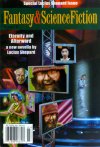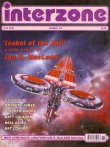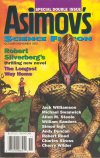The Best Short SF and Fantasy of 2001: A Summation
by Nick Gevers
2001 was a strong, if not outstanding, year for short fiction in the speculative genres. The major print markets — Asimov's, Fantasy & Science Fiction, Interzone, and others — maintained a good standard; Sci Fiction's online inventory of stories was outstanding; and two important anthologies, Starlight 3 (edited by Patrick Nielsen Hayden) and Redshift: Extreme Visions of Speculative Fiction (edited by Al Sarrantonio), served as excellent showcases for new exercises in the "short form". Single-author collections, notably Tales From Earthsea by Ursula K. Le Guin, featured some significant original work; and innovative websites, such as Fantastic Metropolis, Revolution SF, and The Infinite Matrix, began noticeably to expand the range of high-quality Web fiction. Which, then, were the best Fantasy and SF stories of 2001, the elite of a truly science-fictional year?
 The novellas were of especial distinction. The best short novel of 2001 — one of the best ever — was "Eternity and Afterward" by Lucius Shepard (FSF, March), an astonishing account of existential gamuts run by a Russian gangster in a Moscow nightclub rather resembling Hell; a more stringent (and more entertaining) moral manifesto would be hard to find. Another Shepard novella, "Aztechs" (Sci Fiction, Sept), was not quite at the same pitch, but served as an amusing and resonant recapitulation of Shepard's old obsession with the destiny of Central America; familiar Shepard props (drug-addled futuristic GIs, numinous border fences) found new focus, new (and perhaps redemptive) purpose. Also near the top of the list: Elizabeth Hand's brilliant, luminously poetic examination of sexuality, madness, and metamorphosis, "Cleopatra Brimstone" (Redshift), a clear command never to date expatriate lepidopterists; "The Chief Designer" by Andy Duncan (Asimov's, June), one of that author's ineffable secret histories, this time of the monomania of the engineers behind the Soviet space program; and Ian R. MacLeod's "New Light on the Drake Equation" (Sci Fiction, May), a quietly atmospheric examination of an astronomer surviving beyond his time, meditating, dreaming, gaining sight of strange perverse truths. Of consequence as well: "Viewpoint" by Gene Wolfe (Redshift), the weird sidewise story of a young man who turns a reality-TV scenario into an act of valiant resistance against a corrupt Federal Government; "The Finder" by Ursula Le Guin (Tales From Earthsea), the backstory of the world of Earthsea told with a mixture of horror, humor, and nobility; and "The Diamond Pit" by Jack Dann (FSF, June), the Jazz Age satirized to perdition in a whirl of aerobatic stunts, mad reclusive tycoons, lost Shangri-Las, and impossible jealousies — heady stuff.
The novellas were of especial distinction. The best short novel of 2001 — one of the best ever — was "Eternity and Afterward" by Lucius Shepard (FSF, March), an astonishing account of existential gamuts run by a Russian gangster in a Moscow nightclub rather resembling Hell; a more stringent (and more entertaining) moral manifesto would be hard to find. Another Shepard novella, "Aztechs" (Sci Fiction, Sept), was not quite at the same pitch, but served as an amusing and resonant recapitulation of Shepard's old obsession with the destiny of Central America; familiar Shepard props (drug-addled futuristic GIs, numinous border fences) found new focus, new (and perhaps redemptive) purpose. Also near the top of the list: Elizabeth Hand's brilliant, luminously poetic examination of sexuality, madness, and metamorphosis, "Cleopatra Brimstone" (Redshift), a clear command never to date expatriate lepidopterists; "The Chief Designer" by Andy Duncan (Asimov's, June), one of that author's ineffable secret histories, this time of the monomania of the engineers behind the Soviet space program; and Ian R. MacLeod's "New Light on the Drake Equation" (Sci Fiction, May), a quietly atmospheric examination of an astronomer surviving beyond his time, meditating, dreaming, gaining sight of strange perverse truths. Of consequence as well: "Viewpoint" by Gene Wolfe (Redshift), the weird sidewise story of a young man who turns a reality-TV scenario into an act of valiant resistance against a corrupt Federal Government; "The Finder" by Ursula Le Guin (Tales From Earthsea), the backstory of the world of Earthsea told with a mixture of horror, humor, and nobility; and "The Diamond Pit" by Jack Dann (FSF, June), the Jazz Age satirized to perdition in a whirl of aerobatic stunts, mad reclusive tycoons, lost Shangri-Las, and impossible jealousies — heady stuff.
A vital contribution to the viability of the SF novella in Britain — where there are few regular markets for such — continued to be made in 2001 by PS Publishing. That small press issued four superb short novels (and one less distinguished example) in chapbook format this year: Nearly People, by Conrad Williams, an essentially surreal urban dystopia full of meaningful chaos and supercharged menace; Diamond Dogs, by Alastair Reynolds, a searing Gothic space opera about a quest to penetrate a malignant haunted artifact on a far barren planet; Park Polar, by Adam Roberts, a murder mystery of dire speculative venom set in an Arctic base, a sort of Who Goes There? with the shifting sands of human nature replacing the alien shape-shifter; and Ken MacLeod's The Human Front, an ideologically argumentative alternate-history yarn which somehow succeeds in incorporating almost all the fundamental stuffs of SF into a narrative little over twenty thousand words long. These will all be anthologized in due course; they richly deserve that wider audience.
 At novelette length, one story has the aura of the classic. "Isabel of the Fall", by Ian R. MacLeod (Interzone, July), is a mesmerizingly beautiful fabulation of forbidden love, located among the radiant mirrors and warped theologies of a far-future planet at the center of a universe governed by feminist codes of social evolution; this is without question the best novelette of 2001. The runners-up or losing shortlist candidates, champing to excel: "Hell is the Absence of God" by Ted Chiang (Starlight 3), a vision, possibly inspired by Rachel Pollack, of a present-day Earth in which God is a reality, sending His angels out on regular less-than-miraculous errands, and generally behaving in such a fashion as to disprove His own existence, a fine rhetorical inversion; Charles Stross's "Lobsters" (Asimov's, June), a mad essay in conceptual oversaturation and hyperbolic pomo-speak, quite awesome to experience; "The Scab's Progress" by Paul Di Filippo and Bruce Sterling (Sci Fiction, Jan), also postmodernism run amok, a venture by two biotech geeks into the Heart of Darkness, or Eldorado, of an Africa that is decidedly no longer itself; "Commencement", by Joyce Carol Oates (Redshift), academic rituals with their heart most sanguinarily excised; and "One Last Game" by Robert Reed (FSF, Aug), a timeloop tale with an (elegiac) vengeance. Honorable mention also of Richard Paul Russo's "The Dread and Fear of Kings" (Sci Fiction, Oct), Calvino's Invisible Cities carried to a remote world, with a rather more dreadful Great Khan presiding; and "Doing the Unstuck" by Paul Di Filippo (FSF, May), a daft alien-invasion tale involving a sentient wig…
At novelette length, one story has the aura of the classic. "Isabel of the Fall", by Ian R. MacLeod (Interzone, July), is a mesmerizingly beautiful fabulation of forbidden love, located among the radiant mirrors and warped theologies of a far-future planet at the center of a universe governed by feminist codes of social evolution; this is without question the best novelette of 2001. The runners-up or losing shortlist candidates, champing to excel: "Hell is the Absence of God" by Ted Chiang (Starlight 3), a vision, possibly inspired by Rachel Pollack, of a present-day Earth in which God is a reality, sending His angels out on regular less-than-miraculous errands, and generally behaving in such a fashion as to disprove His own existence, a fine rhetorical inversion; Charles Stross's "Lobsters" (Asimov's, June), a mad essay in conceptual oversaturation and hyperbolic pomo-speak, quite awesome to experience; "The Scab's Progress" by Paul Di Filippo and Bruce Sterling (Sci Fiction, Jan), also postmodernism run amok, a venture by two biotech geeks into the Heart of Darkness, or Eldorado, of an Africa that is decidedly no longer itself; "Commencement", by Joyce Carol Oates (Redshift), academic rituals with their heart most sanguinarily excised; and "One Last Game" by Robert Reed (FSF, Aug), a timeloop tale with an (elegiac) vengeance. Honorable mention also of Richard Paul Russo's "The Dread and Fear of Kings" (Sci Fiction, Oct), Calvino's Invisible Cities carried to a remote world, with a rather more dreadful Great Khan presiding; and "Doing the Unstuck" by Paul Di Filippo (FSF, May), a daft alien-invasion tale involving a sentient wig…
 In the short story category, chief honors are, again, easy to bestow: on "The Dog Said Bow-Wow", by Michael Swanwick (Asimov's, Oct/Nov), a cunning caper tale in future-archaic mode, dazzlingly conceived, a transmogrification of the Renaissance that has to be read to be believed. Also of exceptional merit: two stories by Ursula Le Guin, "Bones of the Earth" (Tales From Earthsea), chthonic magic unleashed, and "The Building" (Redshift), a dark anthropological fable of chickens coming meaninglessly home to roost; "The Black Heart" by Patrick O'Leary (Sci Fiction, Aug), corporate capitalism delivered a sudden audacious slash to the jugular; Thomas M. Disch's "Jour De Fete" (FSF, May), medievalism anatomized in a few densely lyrical pages; Chris Beckett's "Marcher" (Interzone, Oct), a somber study of the difficulty of sustaining interdimensional border controls; "His Own Back Yard" by James P. Blaylock (Sci Fiction, July), nostalgia at its most incisively intimate; "Belief", by P. D. Cacek (Redshift), the afterlife as combat zone; and the bizarrely atmospheric "Grandmother Mist", by William R. Eakin (Sci Fiction, Dec), one of the more disturbing homecomings in the realm of fiction. For sheer experimental verve, three other mentions: "In Glory Like Their Star" by Gene Wolfe (FSF, Oct/Nov), a story told but nothing given away; "Self Portrait, With Melanoma, Final Draft" (Interzone, May), by Paul Park, metafictions within metafictions; and Jeff VanderMeer's The Exchange (Hoegbotton & Sons), a short sinister glimpse of life within fabled Ambergris, accompanied (in the deluxe package), by mushrooms, candle, and other evocative curiosities.
In the short story category, chief honors are, again, easy to bestow: on "The Dog Said Bow-Wow", by Michael Swanwick (Asimov's, Oct/Nov), a cunning caper tale in future-archaic mode, dazzlingly conceived, a transmogrification of the Renaissance that has to be read to be believed. Also of exceptional merit: two stories by Ursula Le Guin, "Bones of the Earth" (Tales From Earthsea), chthonic magic unleashed, and "The Building" (Redshift), a dark anthropological fable of chickens coming meaninglessly home to roost; "The Black Heart" by Patrick O'Leary (Sci Fiction, Aug), corporate capitalism delivered a sudden audacious slash to the jugular; Thomas M. Disch's "Jour De Fete" (FSF, May), medievalism anatomized in a few densely lyrical pages; Chris Beckett's "Marcher" (Interzone, Oct), a somber study of the difficulty of sustaining interdimensional border controls; "His Own Back Yard" by James P. Blaylock (Sci Fiction, July), nostalgia at its most incisively intimate; "Belief", by P. D. Cacek (Redshift), the afterlife as combat zone; and the bizarrely atmospheric "Grandmother Mist", by William R. Eakin (Sci Fiction, Dec), one of the more disturbing homecomings in the realm of fiction. For sheer experimental verve, three other mentions: "In Glory Like Their Star" by Gene Wolfe (FSF, Oct/Nov), a story told but nothing given away; "Self Portrait, With Melanoma, Final Draft" (Interzone, May), by Paul Park, metafictions within metafictions; and Jeff VanderMeer's The Exchange (Hoegbotton & Sons), a short sinister glimpse of life within fabled Ambergris, accompanied (in the deluxe package), by mushrooms, candle, and other evocative curiosities.
Thus, subjectively but carefully compiled, the short fiction highlights of 2001. No parodies, please…



